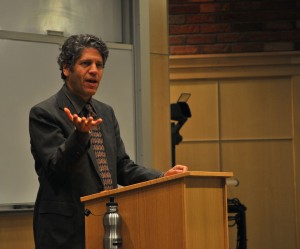Paul Loeb, an author and activist, spoke about civic engagement and finding nonpartisan common ground to an audience of about 80 people at 7 p.m. Monday in Textor 102.
Loeb has published five books on becoming active in society and creating social change, including the critically acclaimed book “The Impossible Will Take a Little While.” The Park School of Communications and the politics department sponsored his hourlong talk.

Loeb said civic involvement has been declining since the 2008 presidential election and addressed what he said are common misconceptions that prevent potential activists from taking action.
“Very early on we learn in our culture not to take a stand,” he said. “We learn, in particular, the only people [who] can take a stand are these absolutely perfect individuals who have everything together — who can answer every possible question and always know exactly what to do.”
He also offered real-life examples of activists who made a difference.
Loeb told stories about Mahatma Gandhi first failing as a lawyer because of shyness before challenging an empire, and how Rosa Parks took a stand against segregation on buses because her work as a secretary for the National Association for the Advancement of Colored People made her part of a community of activists.
“[Rosa Parks] knew her actions were going to be catalyzing something in an ongoing battle for change,” Loeb said. “She knew this wouldn’t be an isolated action [and] that the people she worked with would respond.”
Loeb said standing up for an issue when faced with opposition is crucial to making a difference. Using global warming as an example, Loeb said finding people to rally behind an issue can be difficult but doable.
“You have a dialogue and see if there is any common ground and, if there is, then you try to work on something,” he said.
Junior Brennan McKenna, a residential assistant, said he took his residents to the lecture to hear Loeb’s thoughts on the power of activism. He said Loeb provided inspiration for potential activists looking to take a stand.
“If you do something or try to be an activist alone, like [Loeb] said, you kind of feel overwhelmed with everything that’s going on,” he said. “But if you hear inspirational stories and you’re here with like-minded people, you feel confident.”
Sophomore Danielle Prizzi said though she had not heard of Loeb before the lecture, her passion for social injustice issues motivated her to attend. She said Loeb’s emphasis on overcoming misconceptions about leaders and taking action left an impression on her.
“People aren’t born leaders, and people aren’t born knowing exactly what to do in terms of reacting to social injustice issues,” she said. “It’s just [taking] the first initial step — that really got me.”







